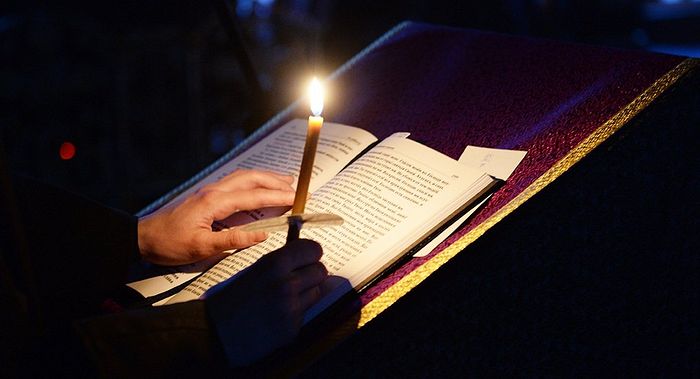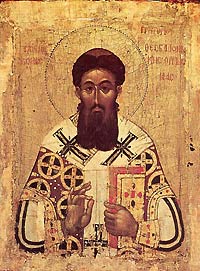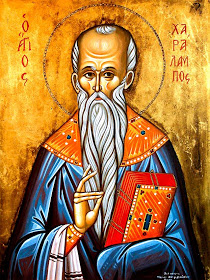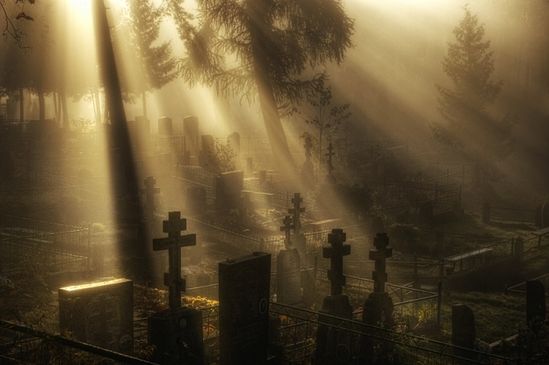 The first week of the Holy Forty Days of Lent, in the words of our pious ancestors and all Orthodox Christians, is called the dawn of abstinence, the week of purity. This week the Church convinces its children to come out of that sinful state into which the whole human race fell and lost paradise through our first parents’ lack of restraint, and which each of us only increases through our own sins; to come out by the path of faith, prayer, humility, and God-pleasing fasting. This is the time of repentance, says the Church, this is the day of salvation, the door to fasting: Be vigilant my soul, and shut the door to the passions; gaze upward toward the Lord.
The first week of the Holy Forty Days of Lent, in the words of our pious ancestors and all Orthodox Christians, is called the dawn of abstinence, the week of purity. This week the Church convinces its children to come out of that sinful state into which the whole human race fell and lost paradise through our first parents’ lack of restraint, and which each of us only increases through our own sins; to come out by the path of faith, prayer, humility, and God-pleasing fasting. This is the time of repentance, says the Church, this is the day of salvation, the door to fasting: Be vigilant my soul, and shut the door to the passions; gaze upward toward the Lord.
Life & Faith
Second Sunday Of Great Lent. St. Gregory Palamas. God Is Light
 Our Holy Father, St. Gregory Palamas
Our Holy Father, St. Gregory Palamas
Commemorated November 14/27, and on the Second Sunday of Great Lent
St. Gregory Palamas, one of the pillars of Orthodoxy, was born in 1296, probably to a noble Anatolian family in Constantinople. He and his brother went to Mount Athos in around 1318, and lived in Vatopedi and Esphigmenou Monasteries. Gregory also successfully persuaded his widowed mother, brothers and sisters to become take up the monastic life. With the encroachment of the Turks, he was forced to flee to Thessalonica, being ordained a priest there in 1326. Afterward, he took up the eremetic life at a mountain near Beroea, and eventually returned to Athos in 1331.
St. Gregory lived in very difficult times, for many heresies were creeping into the Church, and the Ottoman Empire was ever expanding, taking over Byzantine lands. In the early 1300’s he wrote on the nature of the Holy Spirit, showing the errors of the Latin view while living at the hermitage of Saint Savvas on Mount Athos. He became known as a preeminent theologian early in life, due to his many writings and for his beliefs on hesychasm.
St. Gregory is known as one of the great defenders of Orthodoxy and is most well known for his defense against the heresies of Barlaam. Gregory was asked to defend the monastic ways of the Holy Mountain from the charges of Barlaam, a monk of Calabria. Barlaam, influenced by the Latin church, believed that philosophy and human thought were the way to know God. He stated the unknowability of God in an extreme form, having been influenced by a reductionist interpretation of the writings of St. Dionysius the Areopagite. Orthodoxy had always known, through the wisdom of the Holy Fathers, that prayer and fasting are the key to knowing God. Barlaam believed that the monks of Mount Athos were wasting their time in their prayers and fasting when they should be studying the great philosophers of mankind.
St. Gregory said that the Holy Fathers and the prophets had a greater knowledge of God, because they had actually seen or heard God Himself. He taught that modern ideas about human thought and reason had no place in the Church. When asked how it is possible to have knowledge of the unknowable God, he showed the difference between knowing God in His essence or person and knowing God in his energies or being. It became clear that one could not find God in the logic of this world. He taught the Orthodox knowledge that it remains impossible to know God in His essence or person. However, with sufficient prayer and fasting and turning oneself over to God, through purification of one's soul, anyone can come to know Him in His energies and being.
The Barlaam heresies spanned many years and two phases. Due to acts of political power struggles in Constantinople, Gregory was imprisoned to prevent him from speaking the Truth. As the political struggle increased, his accusers multiplied because he would not yield to their heresies, and he opposed the new emperor due to the emperor's acceptance of the heresies.
When St. Gregory criticized Barlaam's rationalism, Barlaam replied with a vicious attack on the hesychastic life of the Athonite monks. Gregory's rebuttal was the Triads in defense of the Holy Hesychasts (c. 1338), a brilliant work whose teaching was affirmed by his fellow Hagiorites, who met together in a council during 1340-1341, issuing a statement known as the Hagioritic Tome, which supported Gregory's theology.
A synod held in Constantinople in 1341 also supported St. Gregory's views, condemning Barlaam. Later, in 1344, the opponents of hesychasm secured a condemnation for heresy and excommunication for Gregory, but the saint's theology was reaffirmed at two further synods held in Constantinople in 1347 and 1351. Collectively, these three synods in Constantinople are held by many Orthodox Christians and several prominent theologians to constitute the Ninth Ecumenical Council. Between the latter two synods, Gregory composed the One Hundred and Fifty Chapters, a concise exposition of his theology.
In 1347, he was consecrated Archbishop of Thessalonica, but the political climate made it impossible for him to take up his see until 1350. During a voyage to the Imperial capital, he was captured by the Turks and held in captivity for over a year. He reposed in 1359, and was glorified by the Orthodox Church in 1368.
The second Sunday of the Great Fast is called the Sunday of Gregory Palamas in all Orthodox Churches. A full service was composed for his feast day, November 14/27, by the Patriarch Philotheus in 1368. St. Gregory’s holy relics are kept in the Cathedral of Thessalonica.
God is Light
On the Second Sunday of Great Lent, we celebrate the memory of St. Gregory Palamas, Archbishop of Thessalonica. On this day, the Holy Church speaks to us about the mystery of light, which we must come to know, if we want to behold the Resurrection of Christ. St. Gregory of Thessalonica and the theological arguments of the fourteenth century connected with his name taught that the light of the Transfiguration is uncreated light. Refuting the heresies of the western theologians, this teaching reminded Christians of the words of the Scripture stating that God is light. By confessing God the Father and God the Son, Light from Light, true God of true God, we believe that God the Light created another light—the one described in the book of Genesis: “God said, let there be light.”
These dogmatic questions were not abstract or removed from the life of the Church. They should not be removed from us, either. It is wrong to look at them as simple theological or scholarly discussions that have no relation to our life. That would mean only one thing: that the light about which God speaks to us—the light in which there is no darkness—will remain unseen to us, and we do not regret or repent that we remain in darkness. All the problems in the Church are, in the final analysis, bound up with the fact that certain mysteries of faith become abstract. They cease to be living, essential questions that decide our fate; and we lose the depth of faith, and the fullness of our Christian calling, which we should be realizing in the Church.
Archpriest Alexander Shargunov
The First Week Of Great Lent: The Dawn Of Abstinence
The Great Canon Of St. Andrew Of Crete. Monday Of The First Week
On Monday of the First Week of Lent, during Great Compline, after Psalm 69, the Canon is sung. The Eirmosi are sung twice, at the beginning and end of each Song. Before each Troparion we make the sign of the Cross and bow three times.
Ode 1
Tone 6
Eirmos: He is my Helper and Protector, and has become my salvation. This is my God and I will glorify Him. My father's God and I will exalt Him. For gloriously has He been glorified. (Exodus 15:2,1; Psalm 117:14)
Catechetical Homily of Ecumenical Patriarch Bartholomew on the beginning of Holy and Great Lent, 2020
The Ecumenical Patriarchate has published Patriarch Bartholomew’s Catechetical Homily at the opening of Holy and Great Lent (2020).
+ BARTHOLOMEW
BY GOD’S MERCY
ARCHBISHOP OF CONSTANTINOPLE – NEW ROME
AND ECUMENICAL PATRIARCH
TO THE PLENITUDE OF THE CHURCH,
MAY THE GRACE AND PEACE
OF OUR LORD AND SAVIOR JESUS CHRIST,
TOGETHER WITH OUR PRAYER, BLESSING AND FORGIVENESS
BE WITH YOU ALL
We offer hymns of thanks to the God of love as once again we enter Holy and Great Lent, the arena of ascetic struggle, fasting and abstinence, of vigilance and spiritual awareness, of guarding our senses and prayer, of humility and self-knowledge. We are commencing a new and blessed pilgrimage toward Holy Pascha, which has “opened for us the gates of paradise.”
Saint Haralambos the Holy Martyr of Magnesia
 This great saint, Haralambos, was a bishop in Magnesia who suffered for Christ in his 113th year. When a terrible persecution began during the reign of Emperor Septimius Severus, the elderly Haralambos did not hide from the persecutors. Instead, he freely and openly preached the Christian Faith. He endured all tortures as though he were in someone else’s body. When they skinned him alive, the forgiving elder said to the emperor’s soldiers: “Thank you, my brethren, for in scraping my old body you renew my spirit for a new eternal life.” He worked many miracles and converted many to the Faith. Even the emperor’s daughter, Galina, abandoned the idolatry of her father and became a Christian. Condemned to death and brought to the place of execution, St. Haralambos raised his hands to heaven and prayed to God for all people, that God would grant them bodily health and spiritual salvation and that He would multiply their fruit of the earth: “O Lord, Thou knowest that men are flesh and blood; forgive them their sins and pour out Thy grace on all!” After praying, this holy elder gave up his soul to God before the executioner lowered the sword on his neck. He suffered in the year 202. The emperor’s daughter, Galina, removed his body and honourably buried it.
This great saint, Haralambos, was a bishop in Magnesia who suffered for Christ in his 113th year. When a terrible persecution began during the reign of Emperor Septimius Severus, the elderly Haralambos did not hide from the persecutors. Instead, he freely and openly preached the Christian Faith. He endured all tortures as though he were in someone else’s body. When they skinned him alive, the forgiving elder said to the emperor’s soldiers: “Thank you, my brethren, for in scraping my old body you renew my spirit for a new eternal life.” He worked many miracles and converted many to the Faith. Even the emperor’s daughter, Galina, abandoned the idolatry of her father and became a Christian. Condemned to death and brought to the place of execution, St. Haralambos raised his hands to heaven and prayed to God for all people, that God would grant them bodily health and spiritual salvation and that He would multiply their fruit of the earth: “O Lord, Thou knowest that men are flesh and blood; forgive them their sins and pour out Thy grace on all!” After praying, this holy elder gave up his soul to God before the executioner lowered the sword on his neck. He suffered in the year 202. The emperor’s daughter, Galina, removed his body and honourably buried it.
Memorial Saturday: Our love in Christ makes our departed ones alive
 On Memorial Saturday just before the Meatfare week, the Holy Church is calling u sto pray for the repose of the souls of our departed relatives who fell asleep in the Lord in the hope of the Ressurection and the eternal life.
On Memorial Saturday just before the Meatfare week, the Holy Church is calling u sto pray for the repose of the souls of our departed relatives who fell asleep in the Lord in the hope of the Ressurection and the eternal life.
In order to understand the importance of offering our prayers for the departed ones, it is necessary to have in mind that Christianity is religion of love. Christ hasn’t left to us, his disciples some teaching about an individual salvation but he has left the commandment to love one another. Love is the foundation and the essence of the Church teaching. The sin is always a lack of love and therefore it is segregation, isolation, a war against everyone. Delivering our prayers for our departed ones means that we meet them in Christ. Christ doesn’t make difference between the dead and the living because everyone is alive in Christ. Loving Christ we do love everyone in Him, loving everyone in Him, we do love Christ. Our love in Christ makes our departed ones alive.

